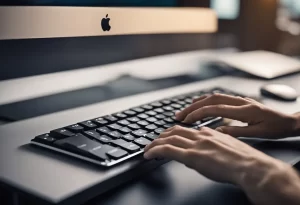How To Easily Add a Wireless Apple Keyboard To Your Devices?
How To Use A Wireless Apple Keyboard Across Multiple Devices

Wireless Apple keyboards are a popular accessory for Mac and iOS device users, offering a convenient and clutter-free typing experience. However, for those unfamiliar with the setup process, connecting an Apple wireless keyboard to a device can be a daunting task. In this article, we will provide step-by-step instructions on how to add a wireless Apple keyboard to a Mac or iOS device, as well as troubleshooting tips for common issues.
Before attempting to connect your Apple wireless keyboard, it is important to ensure that you have all the necessary prerequisites. This includes ensuring that your keyboard is turned on and charged, and that your device has Bluetooth capabilities. Once you have confirmed these prerequisites, you can begin the process of pairing your keyboard with your device. The specific steps for this process will vary depending on whether you are connecting to a Mac or iOS device, but we will provide detailed instructions for both scenarios.
Key Takeaways
- Connecting an Apple wireless keyboard to a Mac or iOS device requires ensuring that you have the necessary prerequisites, such as a charged keyboard and Bluetooth-enabled device.
- The process for pairing your keyboard with your device will vary depending on whether you are connecting to a Mac or iOS device, but we will provide step-by-step instructions for both scenarios.
- If you encounter common issues such as connection problems or unresponsive keys, we will provide troubleshooting tips to help you resolve these issues.
Understanding Wireless Apple Keyboard
The Apple Wireless Keyboard is a Bluetooth-enabled, compact device compatible with Mac, iPhone, iPad, and Apple TV. It has a built-in rechargeable battery lasting up to a month and charges via a Lightning to USB cable. To use it, simply pair the keyboard with the desired device through Bluetooth settings; a passcode may be required during setup. This keyboard offers a convenient, portable typing solution with long battery life, ideal for efficient use across multiple Apple devices.
Prerequisites for Connection

Before connecting an Apple wireless keyboard, it is important to ensure that the device meets the necessary requirements. Here are some prerequisites to consider:
Compatibility
First, check if the Apple wireless keyboard is compatible with the device. Apple wireless keyboards are designed to work seamlessly with Mac computers, iPads, and iPhones. However, there may be compatibility limitations with certain older models. It is recommended to check the compatibility before beginning the connection process.
Bluetooth Connectivity
To connect the Apple wireless keyboard, the device must have Bluetooth connectivity. Bluetooth is a wireless technology that allows devices to communicate with each other over short distances. Ensure that the device has Bluetooth turned on and that it is discoverable.
Power
The Apple wireless keyboard requires power to function. Ensure that the keyboard has sufficient power by inserting fresh batteries or charging the built-in battery if applicable. If the keyboard has a physical power switch, make sure it is in the “on” position.
Passcode
When connecting the Apple wireless keyboard for the first time, a passcode may be required. The passcode is a security measure to ensure that only authorized devices can connect to the keyboard. Follow the on-screen instructions to enter the passcode on the device being connected.
By ensuring that the device meets these prerequisites, the connection process can be completed smoothly.
Connecting Apple Wireless Keyboard to Mac
To connect an Apple wireless keyboard to a Mac, there are two main steps: turning on Bluetooth on the Mac, and pairing the keyboard with the Mac.
Turn on Bluetooth on Mac
To turn on Bluetooth on a Mac, follow these steps:
- Click on the Apple menu in the upper left corner of the screen.
- Select “System Preferences” from the drop-down menu.
- Click on “Bluetooth” in the System Preferences window.
- Ensure that the “Bluetooth” option is turned on.
Pair the Keyboard with Mac
Once Bluetooth is turned on, follow these steps to pair the keyboard with the Mac:
- Turn on the wireless keyboard by pressing the power button until the green LED light turns on.
- Go to the Apple menu and select “System Preferences”.
- Click on “Bluetooth” in the System Preferences window.
- Ensure that the “Bluetooth” option is turned on.
- Wait for the keyboard to appear in the list of devices in the Bluetooth window.
- Click on the keyboard name in the list of devices.
- Click the “Pair” button that appears next to the keyboard name.
- Follow any additional instructions that appear on the screen to complete the pairing process.
Once the keyboard is paired with the Mac, it should be ready to use wirelessly.
Connecting Apple Wireless Keyboard to iOS Device
To connect an Apple wireless keyboard to an iOS device, follow these steps:
Turn on Bluetooth on iOS Device
First, turn on Bluetooth on the iOS device by going to Settings > Bluetooth and toggling the switch to the “on” position. The device will start searching for available Bluetooth devices.
Pair the Keyboard with iOS Device
Next, put the Apple wireless keyboard in pairing mode by pressing and holding the power button until the green light near the power button starts blinking intermittently. Then, on the iOS device, select the keyboard from the list of available Bluetooth devices. If prompted to enter a passcode, enter the passcode on the keyboard and press the Return key.
Once the keyboard is paired with the iOS device, it should be ready to use. If the keyboard does not connect or work properly, try resetting the keyboard by turning it off and on again or resetting the Bluetooth settings on the iOS device.
In summary, connecting an Apple wireless keyboard to an iOS device is a simple process that involves turning on Bluetooth on the iOS device and pairing the keyboard with the device. By following these steps, users can enjoy the convenience and ease of use of an external keyboard with their iOS device.
Troubleshooting Common Issues

If you are having trouble adding your wireless Apple keyboard, there are a few common issues that you may encounter. Here are some troubleshooting steps to help you resolve these issues.
Keyboard Not Responding
If your keyboard is not responding, try the following steps:
- Make sure the keyboard is turned on and has fresh batteries.
- Check that Bluetooth is turned on and working on your device. Go to System Settings > Bluetooth and make sure your device is connected.
- Try resetting your keyboard by turning it off and on again.
- If you are still having issues, try resetting your device’s Bluetooth connection. Go to System Settings > Bluetooth, find your keyboard, and click “Remove.” Then, try re-adding your keyboard.
Keyboard Not Found by Device
If your device is not finding your keyboard, try the following steps:
- Make sure your keyboard is in pairing mode. On some models, this can be done by pressing the power button for a few seconds until the LED light blinks.
- Check that your device’s Bluetooth is turned on and working.
- Move your keyboard closer to your device and try again.
- Try resetting your device’s Bluetooth connection. Go to System Settings > Bluetooth, find your keyboard, and click “Remove.” Then, try re-adding your keyboard.
Unstable Connection
If your connection is unstable, try the following steps:
- Move your keyboard closer to your device and try again.
- Make sure there are no other devices interfering with the Bluetooth signal.
- Try resetting your device’s Bluetooth connection. Go to System Settings > Bluetooth, find your keyboard, and click “Remove.” Then, try re-adding your keyboard.
- If you are still having issues, try resetting your keyboard by turning it off and on again.
By following these troubleshooting steps, you should be able to resolve most common issues when adding a wireless Apple keyboard.
Maintaining Your Apple Wireless Keyboard
To ensure that your Apple Wireless Keyboard continues to function properly, it is important to maintain it properly. Here are a few tips to help you keep your keyboard in top condition:
Keep it Clean
Dirt, dust, and debris can accumulate on your keyboard over time, which can cause keys to stick or stop working altogether. To keep your keyboard clean, use a soft, lint-free cloth to wipe it down regularly. You can also use compressed air to blow out any debris that may have gotten stuck in the keys.
Replace the Batteries
If your keyboard stops working, the first thing you should check is the batteries. Make sure they are properly inserted and have enough charge. If the batteries are low, replace them with fresh ones. Apple recommends using alkaline batteries for best performance.
Turn it Off When Not in Use
To conserve battery life, it is a good idea to turn off your keyboard when you are not using it. Simply press and hold the power button until the green light turns off. This will help extend the life of your batteries, and ensure that your keyboard is ready to use when you need it.
Avoid Excessive Force
Apple keyboards are designed to be lightweight and easy to use. Avoid using excessive force when typing, as this can cause keys to become stuck or break. If a key does become stuck, gently pry it up with a small tool, such as a toothpick or paperclip.
By following these simple tips, you can help ensure that your Apple Wireless Keyboard remains in top condition for years to come.
Conclusion
Adding a wireless Apple keyboard to a Mac is a simple process that can be done within minutes. By following the steps outlined in this article, users can connect their keyboard to their Mac and enjoy the convenience of a wireless setup.
It is important to ensure that the keyboard is turned on and in pairing mode before attempting to connect it to the Mac. Additionally, users should make sure that their Mac’s Bluetooth is turned on and that the keyboard is within range.
Once the keyboard is connected, users can customize its settings in the System Preferences menu. This includes adjusting the keyboard’s function keys, enabling or disabling key repeat, and more.
Overall, adding a wireless Apple keyboard to a Mac can greatly improve productivity and convenience for users. With its easy setup process and customizable settings, it is a great addition to any Mac setup.
Frequently Asked Questions
How do I turn on my Apple wireless keyboard?
To turn on an Apple wireless keyboard, press the power button located on the right side of the keyboard. The power button is circular and has a small LED light next to it that will turn on when the keyboard is powered on. If the LED light does not turn on, ensure that the keyboard is charged and that the batteries are properly inserted.
How do I connect my Apple wireless keyboard to my Mac?
To connect an Apple wireless keyboard to a Mac, first turn on the keyboard and put it in pairing mode. Then, on the Mac, click on the Apple menu and select System Preferences. Next, click on the Bluetooth icon and ensure that Bluetooth is turned on. Your Mac should now detect the keyboard. Click on the keyboard when it appears in the list of available devices and click on the Connect button. Follow the on-screen instructions to complete the pairing process.
How do I pair my Apple wireless keyboard with Windows 10?
To pair an Apple wireless keyboard with Windows 10, first turn on the keyboard and put it in pairing mode. Then, on the Windows 10 device, click on the Start menu and select Settings. Next, click on Devices and then click on Bluetooth & other devices. Ensure that Bluetooth is turned on and then click on Add Bluetooth or other device. Select Bluetooth and then select the Apple wireless keyboard from the list of available devices. Follow the on-screen instructions to complete the pairing process.
Why is my Apple wireless keyboard not pairing?
If your Apple wireless keyboard is not pairing, ensure that it is turned on and in pairing mode. Also, ensure that Bluetooth is turned on and that your device is within range of the keyboard. If the keyboard is still not pairing, try resetting the keyboard by pressing and holding the power button until the LED light flashes. If none of these steps work, try replacing the batteries or charging the keyboard.
How do I add a new Apple keyboard?
To add a new Apple keyboard, first turn on the keyboard and put it in pairing mode. Then, on your device, go to the Bluetooth settings and select Add Bluetooth device. Your device should detect the keyboard and display it in the list of available devices. Click on the keyboard and follow the on-screen instructions to complete the pairing process.
How do I get my Mac to recognize my keyboard?
If your Mac is not recognizing your keyboard, ensure that the keyboard is turned on and in pairing mode. Also, ensure that Bluetooth is turned on and that your keyboard is within range of your Mac. If your Mac is still not recognizing your keyboard, try resetting the keyboard by pressing and holding the power button until the LED light flashes. If none of these steps work, try restarting your Mac or updating your Mac’s software to the latest version.

I am a technology writer and blogger based in the USA. I have over 5 years of experience writing about the latest trends and innovations in the tech industry, with a focus on topics like artificial intelligence, cybersecurity, and social media.



